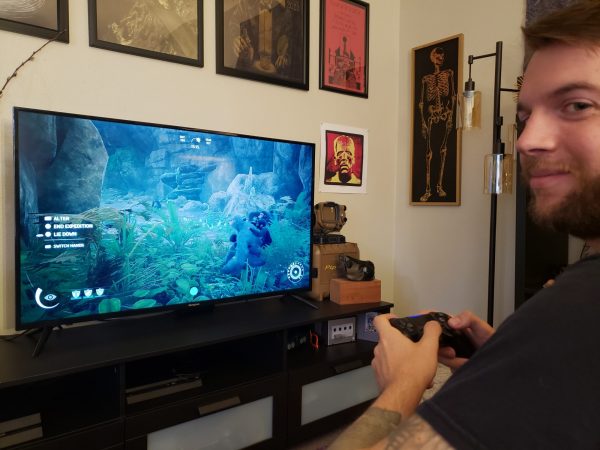Ready Primate One
Joshua Zaffos

Video gaming may be a diversion from research and coursework for some, but Anthropology Ph.D. candidate Alex Pelissero is another species, so to speak.
Pelissero recently published a video-game review in the American Journal of Physical Anthropology, offering his well-qualified commentary on Ancestors: The Humankind Odyssey. Ancestors is a third-person survival game set 7-10 million years ago in Africa where players control a group of hominids, or ape-like human ancestors, who navigate tropical environments on their own and among clans, seeking out food, crafting tools, and basically trying to survive and evolve across generations.
“As both a paleoanthropologist and lover of video games, this game’s existence is personally exciting,” wrote Pelissero who studies early human mobility and their interactions and coevolution with carnivores.
Within the virtual world of Ancestors, there are no maps — it is the Late Miocene Epoch — and players get minimal in-game guidance, a contrast from most role-playing video games. As a player learns and repeats actions and capabilities, they gain “neuronal energy” and can gain new traits and skills such as improved digestion, increased ability to cooperatively hunt prey or evade predators, and bipedalism. A player can switch control between clan members as they play, allowing them to survive and extend their lineage. Death lurks in the forms of starvation, enemies, poisoning, broken bones, and predators, including extinct sabretooth cats, crocodiles, and giant eagles.

“In a video game landscape that has only offered limited, often fantastical depictions of human prehistory, Ancestors is a breath of fresh air,” wrote Pelissero who conducted his research via PlayStation4. Despite some artistic license and imperfect portrayals of evolutionary mechanisms, “Ancestors does a commendable job in its position as one of the only games depicting the evolution of our lineage.”
While Pelissero doesn’t suggest the game replace any Biological Anthropology classes, he does believe it can introduce new and curious gamers to “a creatively executed crash course in the major beats of early hominin evolution.”
“If the peculiar sense of joy I had from successfully chasing off hyenas through cooperative group intimidation, or from knapping my first obsidian tool is shared by other players,” Pelissero wrote, “hopefully, this sparks their desire to learn more.”